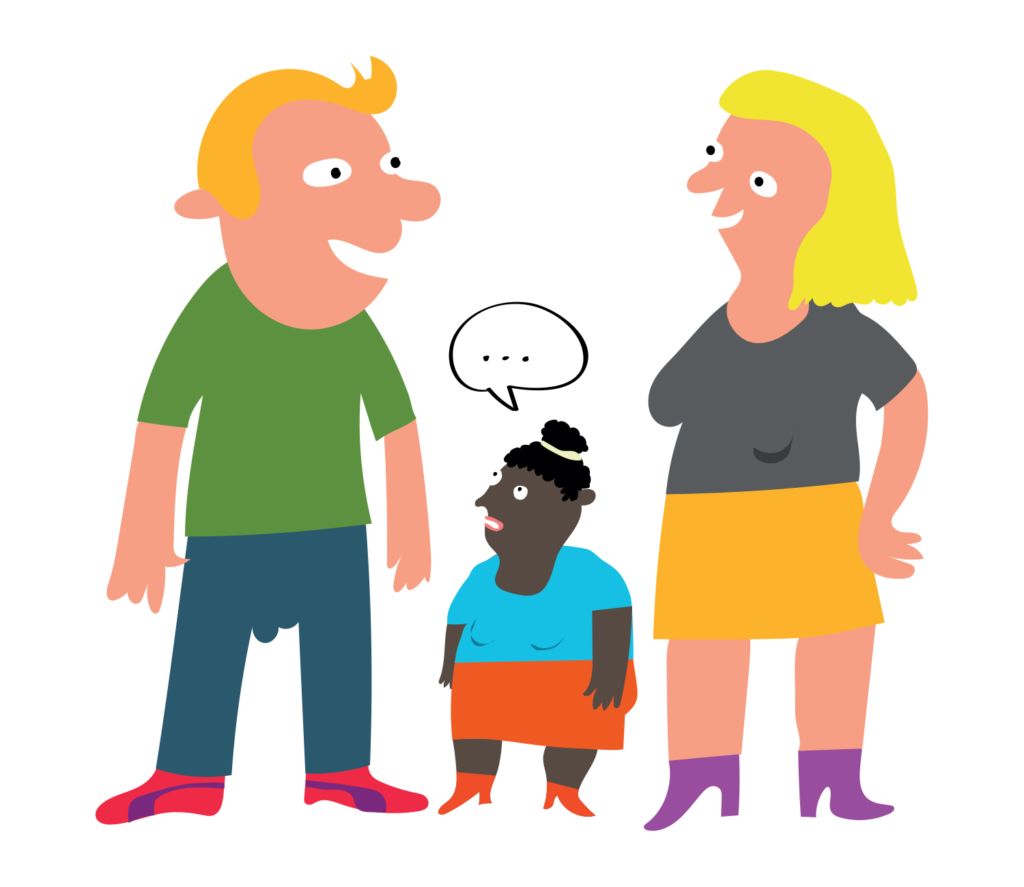The biggest challenge: to become friends with the Dutch
-
 Illustraties: emdé
Illustraties: emdé
Many internationals would like to get to know Dutch students. But this turns out to be easier said than done. It doesn’t help that Introduction Week and student accommodation are often separate. 'It is nice but it has nothing to do with the Netherlands.'
The Danish Master’s student in Spatial Planning Klaus Asbjørn Madsen was rather disappointed during the Introduction Week last August. Back in Denmark, he’d done his utmost to prepare. Over the course of eight months he taught himself Dutch. ‘Every week I watched Zondag met Lubach from Denmark. In this way I taught myself the language, but also all kinds of quaint little news items about the Netherlands – like that story about the “banga lists”. Then I came here, and I was suddenly surrounded by only international students in my Introduction Week group. I was really disappointed.’
Madsen did meet his fellow students later, at an Introduction Day for his Master’s programme. But here too, it turned out that most of the Dutch students had not been invited. ‘The event was only open to students from other cities, so most of the group was still missing.’ It’s a pity, he thinks, to once again have missed out on the opportunity to meet more than half the Dutch students on his programme.
Difficult
The Japanese Sayaka Suzuki, who is following the new Pre-Master’s programme in Tourism and Culture, has spent time in Nijmegen before, as part of an exchange programme. She came back for the city and the high-quality education. But she still doesn’t have any Dutch friends. She also finds it a pity that international Erasmus and Master’s students are kept separate from Dutch students during Introduction Week. ‘This makes it really difficult to meet Dutch students,” says Suzuki. “Which is a pity, since Introduction Week is the best time for it. A few months later, groups have already formed and it’s more difficult to make contact.’
Second-year Master’s student in Medical Biology Wan-Yuh Shih came to Nijmegen last year from Taiwan to follow the interdisciplinary Master’s programme that appealed to her so much. She too is having trouble making Dutch friends. ‘A lot of Dutch students know each other from their Bachelor’s programme and they talk Dutch to each other during breaks. I don’t want to bother them by interrupting, so I spend all my breaks listening without understanding a word of what they’re saying.’
Intimidating
Many international students dream of mingling with Dutch students. But how do you go about it? Suzuki has an idea. Language is an obstacle, but she also suffers from the cultural gap. ‘The Dutch are far more direct than people in Japan. I sometimes find this intimidating.’
It helps to look for places where you can work or do sports with Dutch people, Shih noticed. At the end of the academic year she did an internship at the Donders Institute, which gave her the opportunity for some small-scale networking. ‘The people there are so kind and they really show that they’re interested’, she says. ‘Even the secretary asked me how I was doing. Now I’ve become more daring – and I find it easier to start a conversation with the Dutch students in the lecture hall.’
This afternoon, Klaus Asbjørn Madsen is headed to the Introduction Day at a badminton club. ‘It helps that I’ve lived in other countries before. I’m used to adjusting. And, of course, it helps that I speak the language.’
Flatmates
Another obstacle is separate accommodation. Most international students spend their first year in an SSH& room, in a house or corridor filled only with internationals. ‘That can be fun, but it does not promote integration’, says Shih. Flatmates are usually the people who can help you find your way around, says Ruby Yu Rung Yeng, also from Taiwan. She is following the Erasmus Programme Planet Europe. ‘Your flatmates teach you things about the city, but they can also help if a neighbour doesn’t speak English, or tell you where to buy a new OV chip card.’
Madsen shares a house with students from England, Spain, Italy and Germany. ‘It’s great fun, but it’s got nothing much to do with the Netherlands. I feel our house could just as well be located in Australia or in China. This may sound dramatic, but I sometimes have the feeling that the University is isolating us from the other students on purpose.’ As part of his Bachelor’s programme, he spent six months in Germany. There, every apartment had room for one or two international students. The inhabitants of the apartment could express their preferences: for example, if someone was learning French, they could say they wanted a student from France. ‘In that way, the fact that international students only stayed a while could be turned into a real advantage.’
Portuguese Dyon Pacheco, second-year student in Business Administration, couldn’t agree more. After a year in SSH& accommodation, he now rents a room in a house with Dutch students. ‘I immediately asked my housemates to help me by speaking Dutch to me as much as possible. This is really helping me to learn the language and it makes for a nicer atmosphere. Dutch students tend to spend their weekend at their parents’ place, but during the week we often do things together.’
Lots of money
Besides Introduction Week and accommodation, the main barrier is language, say the students. For example, they noticed that Dutch students are quite hesitant to speak English. International students in turn don’t get a chance to learn Dutch, because they are only here for a short time. In her first year, Shih was so busy with her Master’s programme that she had no time for language lessons. The lessons were also very expensive, she says. ‘Many universities offer courses like this for free, but here they often cost hundreds of euros. I think this is strange. Especially as a non-EU student I already pay such high tuition fees – this kind of additional costs really form an obstacle.’
The Taiwanese student of Spatial Planning Ruby Yu Rung Jeng did manage to pull it off. She has actually made a couple of Dutch friends. Taking part in the Nijmegen Four Day Marches last summer certainly helped. With a few fellow students she trained for weeks, met all sorts of people while walking, and got to know the landscape around Nijmegen really well. And then there she was, at the finish line, with a bouquet of gladioli in her arms, and a couple of brand-new girlfriends.
More mingling next year
Vincent Buitenhuis, Director of SSH&, says accommodation is still separate out of necessity. ‘We’re doing our best to find solutions, but the fact is that international students often look for furnished accommodation. Dutch students, on the other hand, don’t want that, especially if it costs them extra. In addition, international students can only live in SSH& accommodation for one year, otherwise we don’t have enough rooms for them. But Dutch students tend to stay longer, and they don’t want new students constantly moving in and out.’
The fact that Introduction Week mentor groups are also still separate for exchange students and Master’s students (although not for Bachelor’s students), is also a necessary evil, says Head of the International Office Wessel Meijer. The reason is that international students are required to complete different components, such as ‘How does the Dutch educational system work?’ and ‘How do you open a bank account?’. ‘Logistically, it’s impossible for them to attend Introduction Week together with the Dutch students.’ Meijer hopes to have resolved these logistics problems by next year. The International Office is also setting its sights on a free Dutch course for international students.
More mingling next year
Vincent Buitenhuis, Director of SSH&, says accommodation is still separate out of necessity. ‘We’re doing our best to find solutions, but the fact is that international students often look for furnished accommodation. Dutch students, on the other hand, don’t want that, especially if it costs them extra. In addition, international students can only live in SSH& accommodation for one year, otherwise we don’t have enough rooms for them. But Dutch students tend to stay longer, and they don’t want new students constantly moving in and out.’
The fact that Introduction Week mentor groups are also still separate for exchange students and Master’s students (although not for Bachelor’s students), is also a necessary evil, says Head of the International Office Wessel Meijer. The reason is that international students are required to complete different components, such as ‘How does the Dutch educational system work?’ and ‘How do you open a bank account?’. ‘Logistically, it’s impossible for them to attend Introduction Week together with the Dutch students.’ Meijer hopes to have resolved these logistics problems by next year. The International Office is also setting its sights on a free Dutch course for international students.




